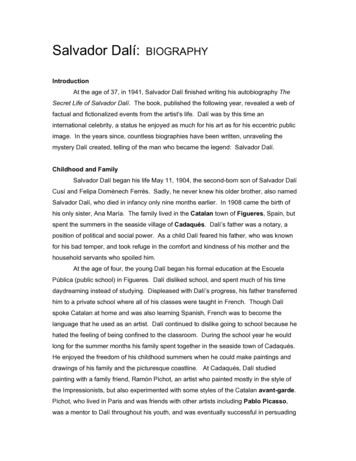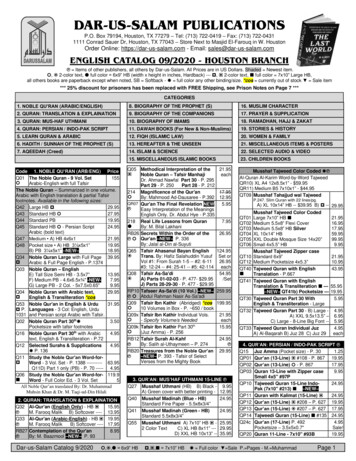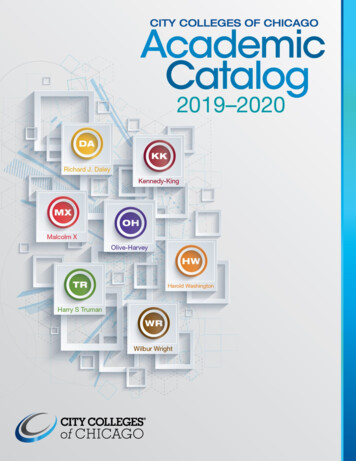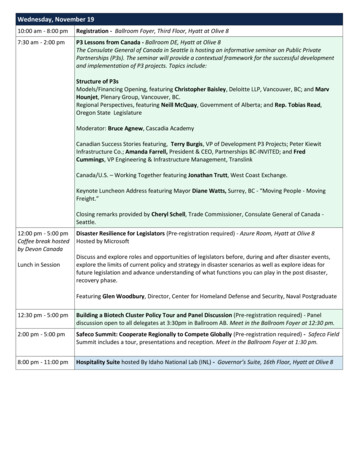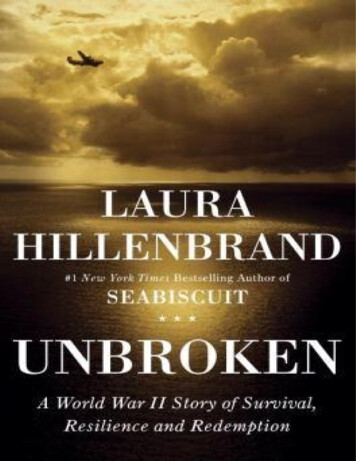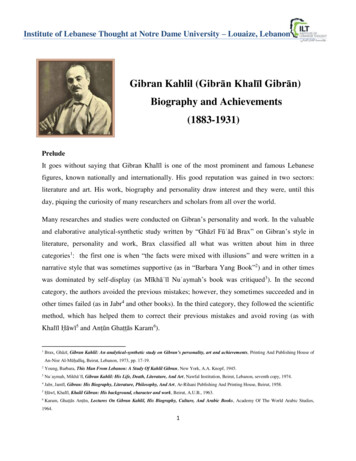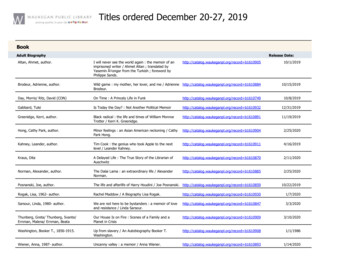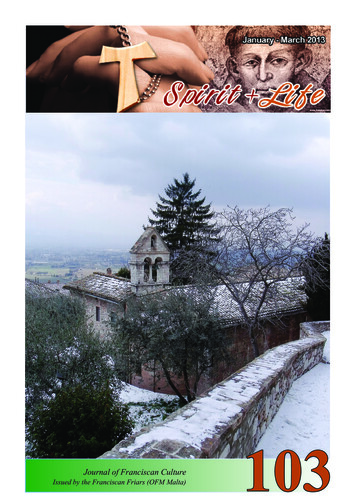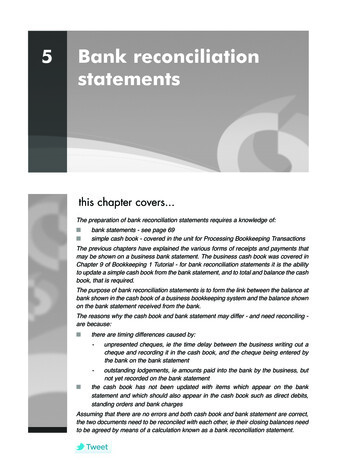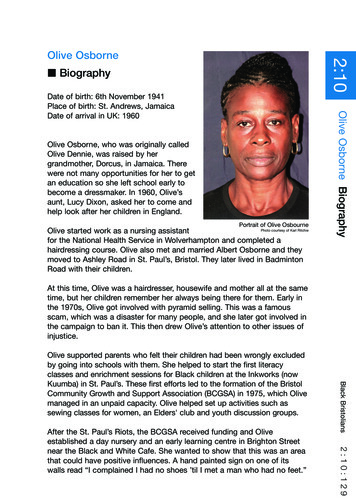
Transcription
2:10Olive OsborneBiographyOlive Osborne, who was originally calledOlive Dennie, was raised by hergrandmother, Dorcus, in Jamaica. Therewere not many opportunities for her to getan education so she left school early tobecome a dressmaker. In 1960, Olive’saunt, Lucy Dixon, asked her to come andhelp look after her children in England.Portrait of Olive OsbournePhoto courtesy of Karl RitchieOlive started work as a nursing assistantfor the National Health Service in Wolverhampton and completed ahairdressing course. Olive also met and married Albert Osborne and theymoved to Ashley Road in St. Paul’s, Bristol. They later lived in BadmintonRoad with their children.Olive Osborne BiographyDate of birth: 6th November 1941Place of birth: St. Andrews, JamaicaDate of arrival in UK: 1960At this time, Olive was a hairdresser, housewife and mother all at the sametime, but her children remember her always being there for them. Early inthe 1970s, Olive got involved with pyramid selling. This was a famousscam, which was a disaster for many people, and she later got involved inthe campaign to ban it. This then drew Olive’s attention to other issues ofinjustice.2:10:129After the St. Paul’s Riots, the BCGSA received funding and Oliveestablished a day nursery and an early learning centre in Brighton Streetnear the Black and White Cafe. She wanted to show that this was an areathat could have positive influences. A hand painted sign on one of itswalls read “I complained I had no shoes ’til I met a man who had no feet.”Black BristoliansOlive supported parents who felt their children had been wrongly excludedby going into schools with them. She helped to start the first literacyclasses and enrichment sessions for Black children at the Inkworks (nowKuumba) in St. Paul’s. These first efforts led to the formation of the BristolCommunity Growth and Support Association (BCGSA) in 1975, which Olivemanaged in an unpaid capacity. Olive helped set up activities such assewing classes for women, an Elders' club and youth discussion groups.
In 1980, Olive became the co-ordinator of the BCGSA, a post she keptuntil 1996.In the 80s, Olive started a drop-in day centre for the growing population ofolder Caribbean people at Brighton Street where Caribbean meals andcraft classes were provided with the help of Social Services. This was latermoved to Ludlow Close.Olive also supported women who were homeless and had mental healthissues and started a hostel for them. Olive worked tirelessly for thecommunity. She was recognised for giving so much of her life to helpingother people. She was given these awards: The Caribbean Times Award in 1984. The British Empire Medal in 1992. An Honorary Degree from University of the West of England in 1993 inrecognition of her outstanding contribution to the city. The Gleaner Company UK Limited and Jamaican National Overseas UKLimited Certificate of Merit in 1994. The South West African and Caribbean Community Award in 1995.Olive’s commitment, drive and determination helped to ensure that theleast privileged in society received a better deal.Black BristoliansOlive Osborne receiving her honorary degreePhoto courtesy of Karl RitchieOlive’s message is:2:10:130“It’s important to draw strength and support from yourelders to guide you through life.”
Teachers’ Background Notes(Based on an interview with her daughter Angela Osborne, as Olive now lives inJamaica.)The lack of educational opportunities in Jamaica meant Olive left school early tobecome a dressmaker. Olive had a daughter called Violet, but in 1960 her aunt,Lucy Dixon, asked her to come and help her look after Lucy’s children. Olive foundherself in Wolverhampton, England.Olive started work as a nursing auxiliary for the National Health Service inWolverhampton and also completed a hairdressing course. Olive met AlbertOsborne, and shortly afterwards they moved with their daughter Angela and herAunt Lucy to Ashley Road, Bristol. After the birth of Sharon, Olive and Albertmoved to Badminton Road where their son Andrew was born.Olive was a hairdresser, housewife and mother all at the same time. A room forhairdressing at the top of the house meant it was always full of people waiting tohave their hair done. The children went to Brownies and Guides, and on Sundaysto City Temple Church and Sunday School. They belonged to youth clubs andOlive made sure that she knew the club leaders and kept in touch with what thechildren were doing. Her children remember her always being there for them, butOlive often had to work Saturday and Sunday nights in a nursing home whileAlbert took care of the children after his working day.2:10:131James Hunt, a Barbadian from Birmingham, organised people from pyramidgroups into self-help groups. He campaigned to ban pyramid selling and tocompensate its victims and also drew attention to other issues. This led Olive andothers in Bristol to lobby Parliament, attend rallies, write letters and organisemeetings.Black BristoliansEarly in the 1970s, Olive got involved with pyramid selling. This scheme appealedto people who worked from home, as they could buy products and sell them tofriends. However, the notorious pyramid selling scam was a disaster for many wholost their homes and health, or even took their own lives.Olive Osborne Teachers’ Background NotesOlive Osborne (née Dennie) was raised by her maternal grandmother, Dorcus, astrong-minded, fiercely independent woman with whom she had a close bond. Hermother, Jemima, also a strong woman was very important to her and both womeninspired her. Dorcus lived a natural life staying in touch with her roots. Like many ofthe women in her family, Olive has a passion for education, unflagging selfdiscipline and a determination to ‘do the right thing’.2:10Olive Osborne
Major cities had similar groups that held regular national rallies. Olive would bookthe coaches for their gatherings, which addressed issues of police injustice, theNational Front, underachievement at schools and deportations. This was the birthof a quiet activist.In Bristol, Olive would support parents who felt their children had been wronglyexcluded by accompanying them into schools. She helped to found the firstliteracy classes and enrichment sessions for Black children at the Inkworks (nowKuumba) in Bristol. These first efforts led to the formation of the Bristol CommunityGrowth and Support Association (BCGSA) in 1975, which Olive managed in anunpaid capacity. The BCGSA also became affiliated to local groups namely TheInkworks, Albert Villas Advice Centre and St. Werburgh’s Community Centre. Shehelped set up activities such as sewing classes for women, an Elders’ club andyouth discussion groups.After the St. Paul’s riots, the BCGSA received funding and Olive established a daynursery in Brighton Street and an early learning centre near the Black and WhiteCafé. She wanted to show the positive aspects of the area. In 1980 Olive becamethe co-ordinator of the BCGSA, a post she kept until 1996.In the 80s, she started a drop-in day centre for the growing population of olderCaribbean people at Brighton Street. Caribbean meals and craft classes wereprovided with the help of Social Services and this later moved to Ludlow Close.She felt that the government’s care in the community policy left people who hadmental health problems wandering the streets. Olive took care of one homelesswoman with such problems, then she established a small hostel for other womenlike her. Olive was awarded the Caribbean Times Award in 1984. She also assistedcommunity organisations, including the Bristol Racial Equality Council, and at thesame time nursed her seriously ill husband, Albert until his death in 1990.When Olive was awarded the British Empire Medal in 1992 she requested that theLord Lieutenant present it at Ludlow Close Day Centre for older people in St. Paul’s.There he was able to witness the well run and happy atmosphere of the Centre.Black BristoliansOlive's other awards include a Master of Arts in 1993, The Gleaner UK andJamaican National Overseas UK Certificate of Merit in 1994, and the South WestAfrican and Caribbean Community Award in 1995. Olive’s commitment, drive anddetermination helped to ensure that the least privileged in society received abetter deal.2:10:132Olive’s message is:“It’s important to draw strength and support from your elders to guide youthrough life.”
Suggested ActivitiesThese are suggested activities based on Olive Osborne’s biography. Theactivities in bold print have a detailed lesson plan on following pagesKS3 ActivitiesHairdressingCreate hair salon in roleplay area. Includeproducts for Black hairand Black hairmagazines to look at.Ask African-Caribbeanparent/carer todemonstrate plaiting.AwardsExplore different awards.Make medals orcertificates. Award pupilsbased on skills andachievements. Hold anaward ceremony.OBE information*Famous JamaicanWomenLouise Bennett – poetand storyteller.Jean Binta Breeze – poetSee pack from EMAS forboth these poets.*Older peopleWho are the oldestpeople we know? Visit toan older peoples’ hometo sing a song and talktogether.Bright Eye Poem*Read PoemShare experiences aboutbeing apart from family oraway from home for thefirst time.Caribbean newspapersUsing Caribbeannewspapers exploreaudience, issues andadverts.SewingAsk for parents/carers,older people and othersfrom the community tohelp the pupils do somesewing – create a classpatchwork.Commitment, drive anddeterminationExplore meanings andderivations of thesewords. Do we or anyonewe know have any ofthese qualities? How canwe develop them?Supplementary SchoolsSurvey of supplementaryschools available inBristol. See CYPSEqualities and InclusionTeam webpage forSupplementary Schools’Directory. Comparesupplementary schoolswith mainstream, discusswhy pupils choose to go.2:10:133*See the resource list for detailsBlack BristoliansKS2 ActivitiesOlive Osborne Suggested ActivitiesFoundation Stage/KS1 Activities2:10Olive Osborne
FSLesson Plan: Hair (PSED, K&U, CLL,MD)Key words/phrases ResourcesHairdresserBarberVocabulary todescribe hairOrganisation/GroupingBiography and pictures of Olive Osborne Whole classItems for role play area.Small groupBooks, magazines and pictures aboutIndividual childhair and hairstyles (to ensure ethnicdiversity and gender).Suggested activities Show pupils the picture of Olive Osborne and talk about it. Tell them her story,responding to questions and generating discussion. Visit to a local hairdresser or barber. Invite a hairdresser or barber in to talk about their job and the tools they use. Read and talk about books about hair. Talk about hair care - washing, brushing etc. Tell each other about their hair, who cuts it, when, where how etc.Olive Osborne Lesson PlanLearning objectives To use descriptive and comparative language. To learn more about how we can care for our hair. To learn more about the role of hairdressers and barbers. To have a developing awareness and respect of the experiences of others.2:10Olive OsborneOpportunities for child initiated experiences Set up hair dresser/barber in role play area- include products such as combs forBlack hair. Towels, phone and book for appointments, combs, brushes.Magazines and pictures (maybe not scissors!) Books, magazines and pictures about hair and hair care. Use ICT programme to choose hair styles. Provide range of materials to make and plait hair for pictures/modelsRecall – Recall with pupils what we have learnt. Pupils have experienced descriptive language and vocabulary. Pupils show developing respect for difference in others. Pupils know about Olive Osborne and her contribution to BristolBlack BristoliansLearning outcomes/Success criteriaParent/Carer involvement*See the resource list for details2:10:135Invite African-Caribbean parent/carer in to plait their children’s hair.
Olive OsborneKS2Lesson Plan: Awards (Art, Design, PSHE)Learning objectives To know that we can be rewarded for our talents and work. To communicate positive things about ourselves and each other. To know how Black and minority ethnic people contribute to BristolKey words/phrases ResourcesOrganisation/GroupingAwardOlive Osborne’s biography and pictureMedalOBE information – Order of theBritish Empire*Suggested activities Read Olive Osborne’s biography and share her picture. Share any previous knowledge about awards the children are aware of includingsports, work, voluntary, for young people and adults. Discuss why and how itmakes us feel to get an award. Collect examples from newspapers. Look atphotographs of different sorts of medals/awards. Ask pupils to discuss what they would like to receive an award for and tonominate another member of the class for an award. Design and if practical makean award. Use the pupils’ designs to give an award regularly in the class. Class teacher willneed to think carefully about each pupil and give award for something the pupilhas excelled in – include full range of curriculum and social aspects.Plenary Show each other our designs and share skills or achievements we are proud of. Celebrate what a talented group of pupils we are.Learning outcomes/Success criteria Pupils know about Olive Osborne’s life and her contribution to Bristol. Pupils have considered awards and designed a medal or award. Pupils know that we all have strengths in different areas.Black BristoliansAssessment opportunitiesHow pupils show pride in themselves.Homework task or Parent/Carer involvementPupils to talk to parents/carers about their strengths.2:10:136*See the resource list for details
KS3Lesson Plan: BME Newspapers (English, Media)2:10Olive OsborneLearning objectivesToToToTolearn the extent and the importance of the Caribbean press in this country.use enquiry and information processing skills.understand that Olive Osborne’s awards were prestigious.know how Black and minority ethnic people contribute to Bristol.Key ticleAdvertisementPressBiography/picture of Olive OsbornePairsCopies of The Voice, Caribbean Times,New Nation, and the Jamaican Gleaner.*Suggested activities Read Olive Osborne’s biography. Discuss the awards that she received and anyissues that arise. Give pairs of pupils pages from the newspapers. Pupils to read articles andadverts. Ask them to comment on who the audience is and how they know. Using the newspaper consider what issues this audience are currentlyconcerned with. Pupils to rank three adverts according to their effectiveness and be able to justifytheir decision. Ask pupils to predict how another minority ethnic group’s (Somali, Indian,Pakistani) newspaper might be similar or different regarding the issues andadverts. Invite pupils to bring another newspaper to the next lesson to study.Olive Osborne Lesson Plan Plenary Ask pupils what they learnt about the African Caribbean community in thiscountry. Would they want a British paper if they lived in another part of the world?If so, what would they want covered in it – news from ‘home’ or news related toBritish people in their new country? Pupils are familiar with range of the Caribbean press in the UK. Pupils have considered the audience and effectiveness of adverts. Pupils know about Olive Osborne and her contribution to Bristol.Assessment opportunitiesHomework task or Parent/Carer involvementPupils to bring another newspaper from a minority ethnic group to next lesson.*See the resource list for details2:10:137Enquiry skills and information processing.Black BristoliansLearning outcomes/Success criteria
Resources2:10Olive Osborne Hair books and magazines Copies of The Voice, Caribbean Times, New Nation, and the JamaicanGleaner available in local shops in St. Paul’s and Easton. Website: Itzcaribbean.com EMAS Poetry Pack contains information and poems from LouiseBennett and poet and storyteller Jean Binta Breeze, including BrightEye poem. Phone EMAS 0117 903 1365. OBE information – Order of the British Empire sheet included(en.wikipedia.org/wiki/Member of the order of the British Empire)Olive Osborne Resources Directory of Bristol Supplementary Schools on the CYPS k Bristolians2:10:139
Olive OsborneResources: Order of the British EmpireThe Most Excellent Order of the British Empire is a British order ofchivalry established on 4 June 1917 by King George V. The Order includesfive classes in civil and military divisions; in decreasing order of seniority,these are: Knight Grand Cross or Dame Grand Cross (GBE) Knight Commander or Dame Commander (KBE or DBE) Commander (CBE) Officer (OBE) Member (MBE)Only the two highest ranks entail admission into knighthood, an honourallowing the recipient to use the title ‘Sir’ (male) or ‘Dame’ (female) beforetheir name, so long as that person is a national of a realm where theQueen is Head of State. If not, the recipient may use the honour but notthe title before their name.There is also a related British Empire Medal, whose recipients are notmembers of the Order, but who are nonetheless affiliated with the Order.This medal is no longer conferred in the United Kingdom or itsdependencies, but is still used by the Cook Islands and by some otherCommonwealth nations.The Order’s motto is For God and the Empire. It is the most junior of theBritish orders of chivalry and has more members than any other.From WikipediaBlack Bristolians2:10:140
Black hair. Towels, phone and book for appointments, combs, brushes. Magazines and pictures (maybe not scissors!) Books, magazines and pictures about hair and hair care. Use ICT programme to choose hair styles. Provide range of materials to make and plait hair for picture
